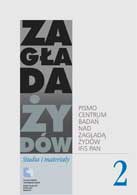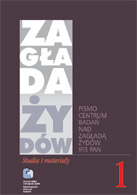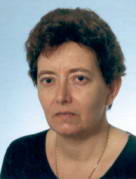Menu
- Main Page
- About us
- Research
- Publications
- Links
- Contact
- Archiwum
- Holocaust. Studies and Materials
the Center's Journal - NIGHT WITHOUT AND END - »FAILED CORRECTION«
- Wybór źródeł
- EHRI PL
News
Open Academic Seminar -Karolina Panz, Zakopane Highlanders and Jews before the War, during the Holocaust, and in the Immediate Postwar Period
Oopen Academic Seminar Karolina Panz Zakopane Highlanders and Jews before the War, during the Holocaust, and in the Immediate Postwar Period Wednesday, January 18, room 161 Staszic Palace (ul. Nowy Swiat St. 72)11.00 A.M. Online participation v...
Call for Articles - Holocaust Studies and Materials 2027
Call for Articles 2027 Call for Articles Numbers and Estimates in Holocaust Research: Limitations, Risks, and Prospects Debates surrounding the Holocaust frequently involve disputes over estimates and numerical data such as, among others, the victims of concentration and ext...
Programme of Center's academic seminars for winter term 2025
We are pleased to announce the return of our scientific seminar series in less than a month, and warmly invite all interested parties to attend. The seminars will be held on the second or third Wednesday of each month, both in person at the Institute of Philosophy and Sociology of the Polis...
M. Turski Historical Award of Polityka for Justyna Majewska
It is with undisguised pride we report that our colleague Dr. Justyna Majewska has been awarded the Marian Turski POLITYKA Historical Prize for her book debut, "Mury i szczeliny. Przestrzenie getta warszawskiego /Walls and Slits. Spaces of the Warsaw Ghetto". We are very happy and...
Call for Articles - Holocaust Studies and Materials 2026
Call for Articles 2026 Call for Articles Connecting scholarly reflection on the Holocaust to the present - new sources and technologies in research The past decade has seen a breakthrough in Holocaust research, both in terms of the availability of archival sources and the digital ...
add your e-mail to the
NEWSLETTER
NEWSLETTER
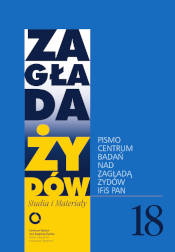 Zagłada Żydów.
Zagłada Żydów.
Studia i Materiały
nr 18, R. 2022
Warszawa 2022
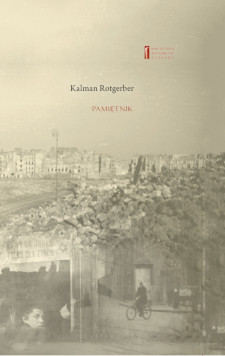 PAMIĘTNIK
PAMIĘTNIK
Kalman Rotgeber
oprac. Aleksandra Bańkowska, wstęp Jacek Leociak
Warszawa 2021
Zagłada Żydów.
Studia i Materiały
nr 17, R. 2021
Warszawa 2021
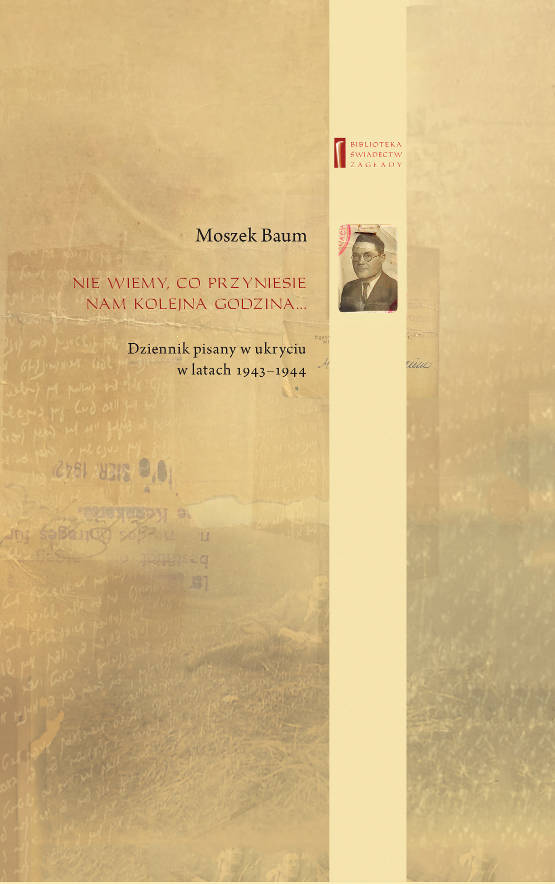 NIE WIEMY CO PRZYNIESIE NAM KOLEJNA GODZINA ...
NIE WIEMY CO PRZYNIESIE NAM KOLEJNA GODZINA ...
Dziennik pisany w ukryciu w latach 1943-1944
Moszek Baum, oprac. Barbara Engelking, tłum. z jidysz Monika Polit
Warszawa 2020
Zagłada Żydów.
Studia i Materiały
nr 16, R. 2020
Warszawa 2020
.jpg) Aryjskiego Żyda wspomnienia, łzy i myśli
Aryjskiego Żyda wspomnienia, łzy i myśli
Zapiski z okupacyjnej Warszawy
Sewek Okonowski, oprac. Marta Janczewska
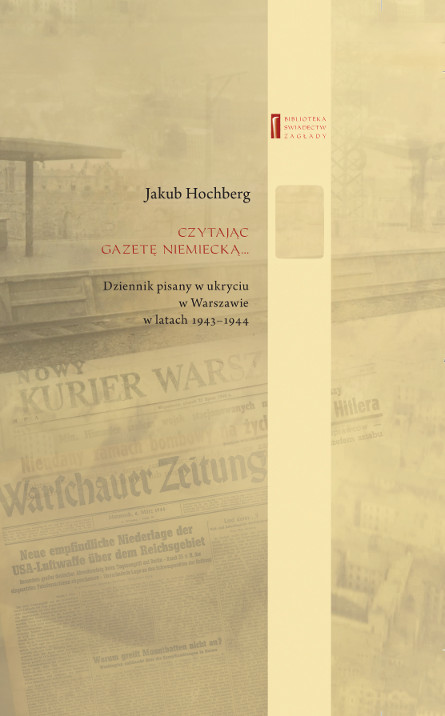 PISZĄCY TE SŁOWA JEST PRACOWNIKIEM
PISZĄCY TE SŁOWA JEST PRACOWNIKIEM
GETTOWEJ INSTYTUCJI ...
'z Dziennika' i inne pisma z łódzkiego getta
Józef Zelkowicz, tłum. z jidysz, oprac. i wstęp. Monika Polit
Warszawa 2019
CZYTAJĄC GAZETĘ NIEMIECKĄ ...
Dziennik pisany w ukryciu w Warszawie w latach 1943-1944
Jakub Hochberg, oprac. i wstępem opatrzyła Barbara Engelking
Warszawa 2019
Zagłada Żydów.
Studia i Materiały
nr 15, R. 2019
Warszawa 2019
.jpg) Zagłada Żydów.
Zagłada Żydów.
Studia i Materiały
nr 14, R. 2018
Warszawa 2018
 DALEJ JEST NOC. Losy Żydów w wybranych powiatach okupowanej Polski
DALEJ JEST NOC. Losy Żydów w wybranych powiatach okupowanej Polski
red. i wstęp Barbara Engelking, Jan Grabowski
Warszawa 2018
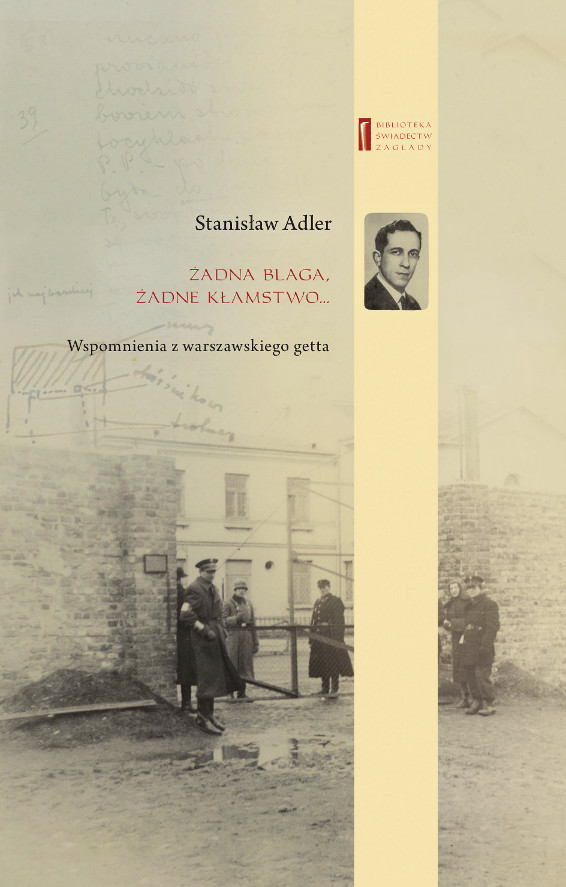 ŻADNA BLAGA, ŻADNE KŁAMSTWO ...
ŻADNA BLAGA, ŻADNE KŁAMSTWO ...
Wspomnienia z warszawskiego getta
Stanisław Adler, oprac. i wstępem opatrzyła Marta Janczewska
Warszawa 2018
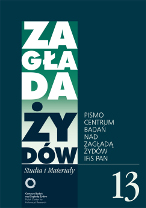 Zagłada Żydów.
Zagłada Żydów.
Studia i Materiały
nr 13, R. 2017
Warszawa 2017
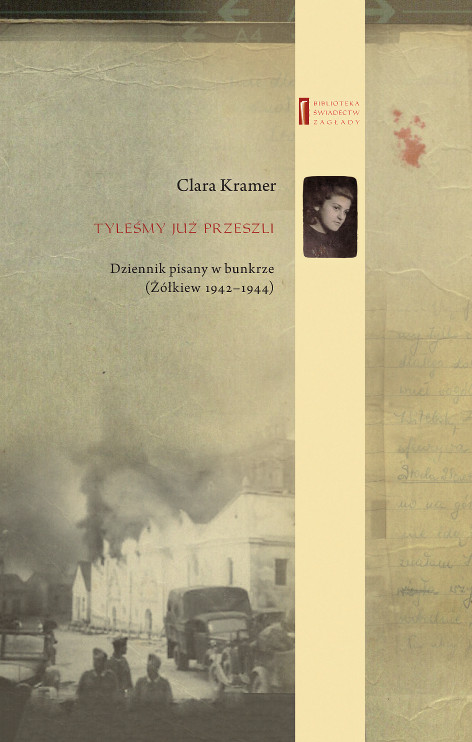 TYLEŚMY JUŻ PRZESZLI ...
TYLEŚMY JUŻ PRZESZLI ...
Dziennik pisany w bunkrze (Żółkiew 1942-1944)
Clara Kramer, oprac. i wstępem opatrzyła Anna Wylegała
Warszawa 2017
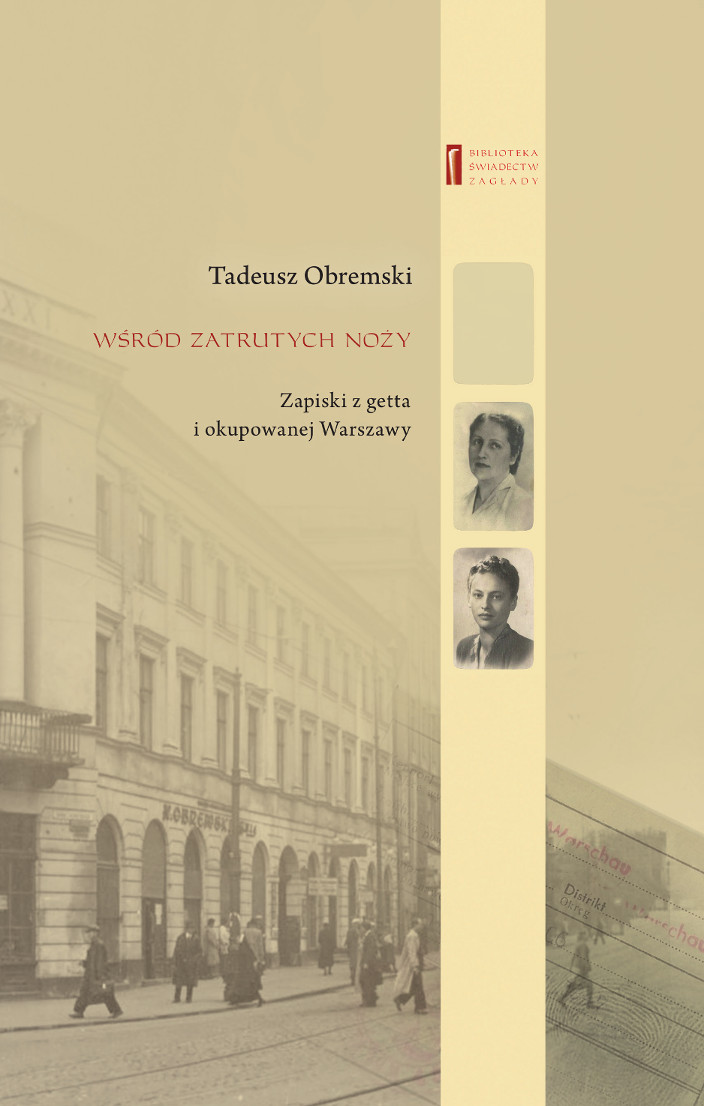 WŚRÓD ZATRUTYCH NOŻY ...
WŚRÓD ZATRUTYCH NOŻY ...
Zapiski z getta i okupowanej Warszawy
Tadeusz Obremski, oprac. i wstępem opatrzyła Agnieszka Haska
Warszawa 2017
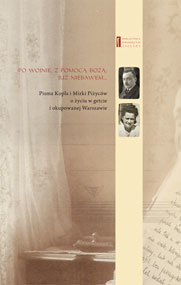 PO WOJNIE, Z POMOCĄ BOŻĄ, JUŻ NIEBAWEM ...
PO WOJNIE, Z POMOCĄ BOŻĄ, JUŻ NIEBAWEM ...
Pisma Kopla i Mirki Piżyców o życiu w getcie i okupowanej Warszawie
oprac. i wstępem opatrzyła Barbara Engelking i Havi Dreifuss
Warszawa 2017
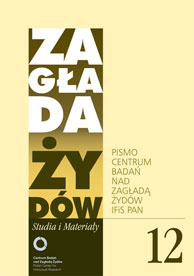 Zagłada Żydów.
Zagłada Żydów.
Studia i Materiały
nr 12, R. 2016
Warszawa 2016
.jpg) SNY CHOCIAŻ MAMY WSPANIAŁE ...
SNY CHOCIAŻ MAMY WSPANIAŁE ...
Okupacyjne dzienniki Żydów z okolic Mińska Mazowieckiego
oprac. i wstępem opatrzyła Barbara Engelking
Warszawa 2016
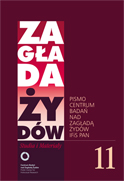 Zagłada Żydów.
Zagłada Żydów.
Studia i Materiały
nr 11, R. 2015
Warszawa 2015
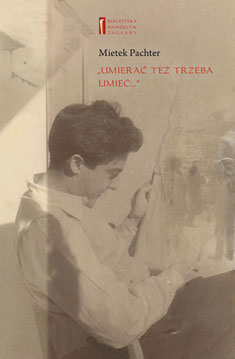 Mietek Pachter
Mietek Pachter
UMIERAĆ TEŻ TRZEBA UMIEĆ ...
oprac. B. Engelking
Warszawa 2015
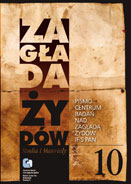 Zagłada Żydów.
Zagłada Żydów.
Studia i Materiały
nr 10, t. I-II, R. 2014
Warszawa 2015
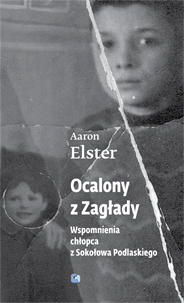 OCALONY Z ZAGŁADY
OCALONY Z ZAGŁADY
Wspomnienia chłopca z Sokołowa Podlaskiego
tłum. Elżbieta Olender-Dmowska
red .B. Engelking i J. Grabowski
Warszawa 2014
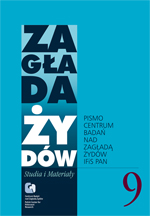 ZAGŁADA ŻYDÓW. STUDIA I MATERIAŁY
ZAGŁADA ŻYDÓW. STUDIA I MATERIAŁY
vol. 9 R. 2013
Pismo Centrum Badań nad Zagładą Żydów IFiS PAN
Warszawa 2013
 ... TĘSKNOTA NACHODZI NAS JAK CIĘŻKA CHOROBA ...
... TĘSKNOTA NACHODZI NAS JAK CIĘŻKA CHOROBA ...
Korespondencja wojenna rodziny Finkelsztejnów, 1939-1941
oprac. i wstępem opatrzyła Ewa Koźmińska-Frejlak
Warszawa 2012
Raul Hilberg
PAMIĘĆ I POLITYKA. Droga historyka Zagłady
tłum. Jerzy Giebułtowski
Warszawa 2012
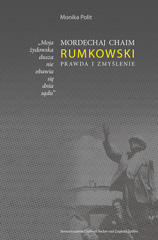 Monika Polit
Monika Polit
"Moja żydowska dusza nie obawia się dnia sądu."
Mordechaj Chaim Rumkowski. Prawda i zmyślenie
Warszawa 2012
.jpg) Dariusz Libionka i Laurence Weinbaum
Dariusz Libionka i Laurence Weinbaum
Bohaterowie, hochsztaplerzy, opisywacze. Wokół Żydowskiego Związku Wojskowego
Warszawa 2011
.jpg) Zagłada Żydów.
Zagłada Żydów.
Studia i Materiały
R. 2011, nr. 7; Warszawa 2011
.jpg) Jan Grabowski
Jan Grabowski
JUDENJAGD. Polowanie na Żydów 1942.1945.
Studium dziejów pewnego powiatu
Warszawa 2011
.jpg) Stanisław Gombiński (Jan Mawult)
Stanisław Gombiński (Jan Mawult)
Wspomnienia policjanta z warszawskiego getta
oprac. i wstęp Marta Janczewska
Warszawa 2010
Holocaust Studies and Materials
Journal of the Polish Center for Holocaust Research
Warssaw 2010
.jpg) Żydów łamiących prawo należy karać śmiercią!
Żydów łamiących prawo należy karać śmiercią!
"Przestępczość" Żydów w Warszawie, 1939-1942
B. Engelking, J. Grabowski
Warszawa 2010
Zagłada Żydów.
Studia i Materiały
R. 2010, nr. 6; Warszawa 2010
Wybór źródeł do nauczania o zagładzie Żydów
Ćwiczenia ze źródłami
red. A. Skibińska, R. Szuchta
Warszawa 2010
.jpg) W Imię Boże!
W Imię Boże!
Cecylia Gruft
oprac. i wstęp Łukasz Biedka
Warszawa 2009
Zagłada Żydów.
Studia i Materiały
R. 2009, nr. 5; Warszawa 2009
.jpg) Żydzi w powstańczej Warszawie
Żydzi w powstańczej Warszawie
Barbara Engelking i Dariusz Libionka
Warszawa 2009
 Reportaże z warszawskiego getta
Reportaże z warszawskiego getta
Perec Opoczyński
Warszawa 2009
 Notatnik
Notatnik
Szmul Rozensztajn
Warszawa 2008
.jpg) Holocaust
Holocaust
Studies and Materials.
English edition
2008, vol. 1; Warsaw 2008
.jpg) Źródła do badań nad zagładą Żydów na okupowanych ziemiach polskich
Źródła do badań nad zagładą Żydów na okupowanych ziemiach polskich
Przewodnik archiwalno-bibliograficzny
Alina Skibińska, wsp. Marta Janczewska, Dariusz Libionka, Witold Mędykowski, Jacek Andrzej Młynarczyk, Jakub Petelewicz, Monika Polit
Warszawa 2007
Zagłada Żydów. Studia i Materiały
R. 2007, nr. 3; Warszawa 2007
Prowincja noc.
Życie i zagłada Żydów w dystrykcie warszawskim
Warszawa 2007
.jpg) Utajone miasto.
Utajone miasto.
Żydzi po 'aryjskiej' stronie Warszawy [1941-1944]
Gunnar S Paulsson
Kraków 2007
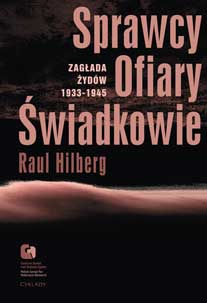 Sprawcy, Ofiary, Świadkowie.
Sprawcy, Ofiary, Świadkowie.
Zagłada Żydów, 1933-1944
Raul Hilberg
Warszawa 2007
Zagłada Żydów. Studia i Materiały
R. 2006, nr. 2; Warszawa 2006
"Jestem Żydem, chcę wejść!".
Hotel Polski w Warszawie, 1943.
Agnieszka Haska
Warszawa 2006
Zagłada Żydów. Studia i Materiały
R. 2005, nr. 1; Warszawa 2005
.jpg) 'Ja tego Żyda znam!'
'Ja tego Żyda znam!'
Szantażowanie Żydów w Warszawie, 1939-1943.
Jan Grabowski
Warszawa 2004
 'Szanowny panie Gistapo!'
'Szanowny panie Gistapo!'
Donosy do władz niemieckich w Warszawie i okolichach, 1940-1941
Barbara Engelking, Warszawa 2003
aaa
 Zagłada Żydów.
Zagłada Żydów.
Studia i Materiały
nr 18, R. 2022
Warszawa 2022
 PAMIĘTNIK
PAMIĘTNIK
Kalman Rotgeber
oprac. Aleksandra Bańkowska, wstęp Jacek Leociak
Warszawa 2021
Zagłada Żydów.
Studia i Materiały
nr 17, R. 2021
Warszawa 2021
 NIE WIEMY CO PRZYNIESIE NAM KOLEJNA GODZINA ...
NIE WIEMY CO PRZYNIESIE NAM KOLEJNA GODZINA ...
Dziennik pisany w ukryciu w latach 1943-1944
Moszek Baum, oprac. Barbara Engelking, tłum. z jidysz Monika Polit
Warszawa 2020
Zagłada Żydów.
Studia i Materiały
nr 16, R. 2020
Warszawa 2020
.jpg) Aryjskiego Żyda wspomnienia, łzy i myśli
Aryjskiego Żyda wspomnienia, łzy i myśli
Zapiski z okupacyjnej Warszawy
Sewek Okonowski, oprac. Marta Janczewska
 PISZĄCY TE SŁOWA JEST PRACOWNIKIEM
PISZĄCY TE SŁOWA JEST PRACOWNIKIEM
GETTOWEJ INSTYTUCJI ...
'z Dziennika' i inne pisma z łódzkiego getta
Józef Zelkowicz, tłum. z jidysz, oprac. i wstęp. Monika Polit
Warszawa 2019
CZYTAJĄC GAZETĘ NIEMIECKĄ ...
Dziennik pisany w ukryciu w Warszawie w latach 1943-1944
Jakub Hochberg, oprac. i wstępem opatrzyła Barbara Engelking
Warszawa 2019
Zagłada Żydów.
Studia i Materiały
nr 15, R. 2019
Warszawa 2019
.jpg) Zagłada Żydów.
Zagłada Żydów.
Studia i Materiały
nr 14, R. 2018
Warszawa 2018
 DALEJ JEST NOC. Losy Żydów w wybranych powiatach okupowanej Polski
DALEJ JEST NOC. Losy Żydów w wybranych powiatach okupowanej Polski
red. i wstęp Barbara Engelking, Jan Grabowski
Warszawa 2018
 ŻADNA BLAGA, ŻADNE KŁAMSTWO ...
ŻADNA BLAGA, ŻADNE KŁAMSTWO ...
Wspomnienia z warszawskiego getta
Stanisław Adler, oprac. i wstępem opatrzyła Marta Janczewska
Warszawa 2018
 Zagłada Żydów.
Zagłada Żydów.
Studia i Materiały
nr 13, R. 2017
Warszawa 2017
 TYLEŚMY JUŻ PRZESZLI ...
TYLEŚMY JUŻ PRZESZLI ...
Dziennik pisany w bunkrze (Żółkiew 1942-1944)
Clara Kramer, oprac. i wstępem opatrzyła Anna Wylegała
Warszawa 2017
 WŚRÓD ZATRUTYCH NOŻY ...
WŚRÓD ZATRUTYCH NOŻY ...
Zapiski z getta i okupowanej Warszawy
Tadeusz Obremski, oprac. i wstępem opatrzyła Agnieszka Haska
Warszawa 2017
 PO WOJNIE, Z POMOCĄ BOŻĄ, JUŻ NIEBAWEM ...
PO WOJNIE, Z POMOCĄ BOŻĄ, JUŻ NIEBAWEM ...
Pisma Kopla i Mirki Piżyców o życiu w getcie i okupowanej Warszawie
oprac. i wstępem opatrzyła Barbara Engelking i Havi Dreifuss
Warszawa 2017
 Zagłada Żydów.
Zagłada Żydów.
Studia i Materiały
nr 12, R. 2016
Warszawa 2016
.jpg) SNY CHOCIAŻ MAMY WSPANIAŁE ...
SNY CHOCIAŻ MAMY WSPANIAŁE ...
Okupacyjne dzienniki Żydów z okolic Mińska Mazowieckiego
oprac. i wstępem opatrzyła Barbara Engelking
Warszawa 2016
 Zagłada Żydów.
Zagłada Żydów.
Studia i Materiały
nr 11, R. 2015
Warszawa 2015
 Mietek Pachter
Mietek Pachter
UMIERAĆ TEŻ TRZEBA UMIEĆ ...
oprac. B. Engelking
Warszawa 2015
 Zagłada Żydów.
Zagłada Żydów.
Studia i Materiały
nr 10, t. I-II, R. 2014
Warszawa 2015
 OCALONY Z ZAGŁADY
OCALONY Z ZAGŁADY
Wspomnienia chłopca z Sokołowa Podlaskiego
tłum. Elżbieta Olender-Dmowska
red .B. Engelking i J. Grabowski
Warszawa 2014
 ZAGŁADA ŻYDÓW. STUDIA I MATERIAŁY
ZAGŁADA ŻYDÓW. STUDIA I MATERIAŁY
vol. 9 R. 2013
Pismo Centrum Badań nad Zagładą Żydów IFiS PAN
Warszawa 2013
 ... TĘSKNOTA NACHODZI NAS JAK CIĘŻKA CHOROBA ...
... TĘSKNOTA NACHODZI NAS JAK CIĘŻKA CHOROBA ...
Korespondencja wojenna rodziny Finkelsztejnów, 1939-1941
oprac. i wstępem opatrzyła Ewa Koźmińska-Frejlak
Warszawa 2012
Raul Hilberg
PAMIĘĆ I POLITYKA. Droga historyka Zagłady
tłum. Jerzy Giebułtowski
Warszawa 2012
 Monika Polit
Monika Polit
"Moja żydowska dusza nie obawia się dnia sądu."
Mordechaj Chaim Rumkowski. Prawda i zmyślenie
Warszawa 2012
.jpg) Dariusz Libionka i Laurence Weinbaum
Dariusz Libionka i Laurence Weinbaum
Bohaterowie, hochsztaplerzy, opisywacze. Wokół Żydowskiego Związku Wojskowego
Warszawa 2011
.jpg) Zagłada Żydów.
Zagłada Żydów.
Studia i Materiały
R. 2011, nr. 7; Warszawa 2011
.jpg) Jan Grabowski
Jan Grabowski
JUDENJAGD. Polowanie na Żydów 1942.1945.
Studium dziejów pewnego powiatu
Warszawa 2011
.jpg) Stanisław Gombiński (Jan Mawult)
Stanisław Gombiński (Jan Mawult)
Wspomnienia policjanta z warszawskiego getta
oprac. i wstęp Marta Janczewska
Warszawa 2010
Holocaust Studies and Materials
Journal of the Polish Center for Holocaust Research
Warssaw 2010
.jpg) Żydów łamiących prawo należy karać śmiercią!
Żydów łamiących prawo należy karać śmiercią!
"Przestępczość" Żydów w Warszawie, 1939-1942
B. Engelking, J. Grabowski
Warszawa 2010
Zagłada Żydów.
Studia i Materiały
R. 2010, nr. 6; Warszawa 2010
Wybór źródeł do nauczania o zagładzie Żydów
Ćwiczenia ze źródłami
red. A. Skibińska, R. Szuchta
Warszawa 2010
.jpg) W Imię Boże!
W Imię Boże!
Cecylia Gruft
oprac. i wstęp Łukasz Biedka
Warszawa 2009
Zagłada Żydów.
Studia i Materiały
R. 2009, nr. 5; Warszawa 2009
.jpg) Żydzi w powstańczej Warszawie
Żydzi w powstańczej Warszawie
Barbara Engelking i Dariusz Libionka
Warszawa 2009
 Reportaże z warszawskiego getta
Reportaże z warszawskiego getta
Perec Opoczyński
Warszawa 2009
 Notatnik
Notatnik
Szmul Rozensztajn
Warszawa 2008
.jpg) Holocaust
Holocaust
Studies and Materials.
English edition
2008, vol. 1; Warsaw 2008
.jpg) Źródła do badań nad zagładą Żydów na okupowanych ziemiach polskich
Źródła do badań nad zagładą Żydów na okupowanych ziemiach polskich
Przewodnik archiwalno-bibliograficzny
Alina Skibińska, wsp. Marta Janczewska, Dariusz Libionka, Witold Mędykowski, Jacek Andrzej Młynarczyk, Jakub Petelewicz, Monika Polit
Warszawa 2007
Zagłada Żydów. Studia i Materiały
R. 2007, nr. 3; Warszawa 2007
Prowincja noc.
Życie i zagłada Żydów w dystrykcie warszawskim
Warszawa 2007
.jpg) Utajone miasto.
Utajone miasto.
Żydzi po 'aryjskiej' stronie Warszawy [1941-1944]
Gunnar S Paulsson
Kraków 2007
 Sprawcy, Ofiary, Świadkowie.
Sprawcy, Ofiary, Świadkowie.
Zagłada Żydów, 1933-1944
Raul Hilberg
Warszawa 2007
Zagłada Żydów. Studia i Materiały
R. 2006, nr. 2; Warszawa 2006
"Jestem Żydem, chcę wejść!".
Hotel Polski w Warszawie, 1943.
Agnieszka Haska
Warszawa 2006
Zagłada Żydów. Studia i Materiały
R. 2005, nr. 1; Warszawa 2005
.jpg) 'Ja tego Żyda znam!'
'Ja tego Żyda znam!'
Szantażowanie Żydów w Warszawie, 1939-1943.
Jan Grabowski
Warszawa 2004
 'Szanowny panie Gistapo!'
'Szanowny panie Gistapo!'
Donosy do władz niemieckich w Warszawie i okolichach, 1940-1941
Barbara Engelking, Warszawa 2003
aaa
Polish Center for Holocaust Research
Nowy Swiat St. 72, 00-330 Warsaw; POLAND;
Palac Staszica room 120
e-mail: centrum@holocaustresearch.pl
Nowy Swiat St. 72, 00-330 Warsaw; POLAND;
Palac Staszica room 120
e-mail: centrum@holocaustresearch.pl
Małgorzata Melchior
Sociologist, Professor in the Institute of Applied Social Sciences, The University of Warsaw (UW), member of the Senate of the UW (2001-2004).
She graduated from the interdisciplinary studies (the Institute of Social Prevention and Resocialization UW) in 1979; Ph.D. in 1990 (Institute of Sociology, University of Warsaw) - "The Social Identity of an Individual: a Research Alternative. The Case of Poles of Jewish Origin Born in 1944-1955". In 2004 she passed positively the examination on the thesis (the book: „The Holocaust and Identity”) presented to be qualified for assistant-professorship. Since 1979 she has been working at the University of Warsaw, actually in the Institute of Applied Social Sciences where she is giving courses (general sociology, sociology of social minorities, etc.) and seminars for students – Master’s and Doctor’s degrees."
Research interests:
Sociological issues related to social minorities, the problems of individual perception of social identity; the history of the Holocaust and Polish-Jewish relations;
Books:
- „Społeczna tożsamość jednostki (w świetle wywiadów z Polakami pochodzenia żydowskiego urodzonymi w latach 1944-1955)”("The Social Identity of an Individual. In the Light of interviews with Poles of Jewish Origin Born in 1944-1955). Uniwersytet Warszawski ISNS, Warsaw1990 ( Voted as a book of the year by the Polish Sociological Association and a recipient of the 1993 Stanislaw Ossowski Prize)
- "Zagłada a tożsamość. Polscy Żydzi ocaleni na 'aryjskich papierach'. Analiza doświadczenia biograficznego” (The Holocaust and Identity. Polish Jews who Survived With
. An analysis of Biographical Experience"). IFiS PAN, Warszawa 2004.
Book chapters and articles:
- „Jewish Identity in Poland: Between Ascription and Choice”; in: „A Quest for Identity. Post War Jewish Biographies”, edited by Y.Kashti, F.Eros, D.Schers, D.Zisenwine, Studies in Jewish Culture Identity and Community, School of Education - Tel Aviv University, Israel 1996 (in English), pp. 95-110;
- Co-author: H.Datner, „Absence and Returns: Jews in Contemporary Poland”, [in:] „From Homogeneity to Multiculturalism - Minorities Old and New in Poland”, edited by F.E. Ian Hamilton and Krystyna Iglicka, School of Slavonic and East European Studies, London 2000; ss. 90-113;
- „Zagrożenie eksterminacją w doświadczeniu biograficznym ocalonych z Holocaustu”, [w:] PRZEGLĄD SOCJOLOGICZNY, tom XLIX/2, 2000, s. 69-88;
- „Jewish Identity Options in Contemporary Poland”, [in:] „Proceedings of the Twelfth World Congress of Jewish Studies”, edited by World Union of Jewish Studies, in Cooperation with Sapir Academic College, Jerusalem 2001, Israel (153-168);
- „Threat of Extermination in Biographical Experience of the Holocaust Survivors”, [in} POLISH SOCIOLOGICAL REVIEW, No. 1(137), 2002, s.53-70;
- „Being Different: Construction of Individual Identity” – [in:] „Identity in Transformation: Postmodernity, Postcommunism, and Globalization”, edited by Marian Kempny and Aldona Jawłowska, published by Greenwood Publishing Group, 2002;
- “Moral Attitudes and Conflicts of the Holocaust Survivors who Passed as Non-Jews”, [in:] “STUDIA JUDAICA”, Kraków 2002, No.1(9), s.139-152;
- “Być kimś innym – doświadczenie polskich Żydów ocalałych z Zagłady
”, [w]: „Żydzi i judaizm we współczesnych badaniach polskich”, tom III, ed. By K.Pilarczyk, suplement Nr 1 do STUDIA JUDAICA, Antykwa, Kraków 2003, s.255-276. - „Pamięć o Zagładzie w doświadczeniu biograficznym Ocalonych”, [in:] „Konstruowanie Jaźni i Społeczeństwa. Europejskie warianty interakcjonizmu symbolicznego”, Hałas Elżbieta, Konecki Krzysztof Tomasz (red.), Wydawnictwo Naukowe SCHOLAR, Warszawa 2005, s. 113-128;
- „Gdy granica była murem getta... Refleksje o przekraczaniu granic i o transgraniczności w obliczu zagrożenia życia”, [in:] „Transgraniczność w perspektywie socjologicznej. Nowe pogranicza?”, Lubuskie Towarzystwo Naukowe, Zielona Góra 2006, s. 51-68;
- « Changer de nom et changer d’identité : le cas des survivants de l’Holocauste qui ont survécu sous une identité d’emprunt », [in:] « Identitée en errance. Multi-identité, territoire impermanent et être social », sous la direction Pierre W. Boudreault, Denis Jeffrey, Les Presses de l'Université Laval (PUL); Montréal, Quebec, Canada 2007, p17-28;
- “The Holocaust Survivors who passed as non-Jews – in nazi-occupied Poland and France. The comparison of the Survivors experience”, [in]: „Proceedings of the Fourtheenth World Congress of Jewish Studies”, edited by World Union of Jewish Studies, in Cooperation with Sapir Academic College, Jerusalem 2007 /in press/, Israel;
- „Zagłada i stosunki polsko-żydowskie w opracowaniach socjologicznych”, [w:] „Zagłada Żydów. Studia i Materiały”. Pismo Centrum Badań nad Zagładą Żydów, nr 1/2005, IFiS PAN, Warszawa, s. 52-72
- Uciekinierzy z gett po „stronie aryjskiej” na prowincji dystryktu warszawskiego – sposoby przetrwania” [in:] „Prowincja Noc. Życie i zagłada Żydów w Dystrykcie Warszawskim”, red. Barbara Engelking-Boni, Jacek Leociak i Dariusz Libionka, wyd. IFiS PAN, Warszawa 2007, s. 321-372.
- „Powroty do mitycznej ojczyzny. Przypadek [polskich] Żydów” [“Returns to the Mythical Homeland. The Jewish Case”], [in:] „Współczesne migracje powrotne” [Contemporary Return Migrations], ed. E.Nowicka, IS UW, Warszawa 2007 /in press/;
- “Facing anti-Semitism in Poland – during the Second World War and in March 1968”, [in:] POLIN : Studies in Polish Jewry”, Volume 21, 2008: 1968: Forty Years After, Leszek W. Gluchowski and Antony Polonsky (eds.), pp. 187-203;
- „Uciekinierzy z gett po „stronie aryjskiej” na prowincji dystryktu warszawskiego – sposoby przetrwania” [in:] „Prowincja Noc. Życie i zagłada Żydów w Dystrykcie Warszawskim”, red. Barbara Engelking-Boni, Jacek Leociak i Dariusz Libionka, wyd. IFiS PAN, Warszawa 2007, s. 321-372.
- “Returns to the Mythical Homeland. The Jewish Case”, [in:] "Home Coming. An Anthology of Return Migrations", ed. E.Nowicka, Kraków: NOMOS, pp.211-219, 2008;
- „O niektórych dylematach i rozterkach moralnych osób ocalonych z Zagłady”, [w:] „O społeczeństwie, moralności i nauce. Miscellanea”, red. W. Pawlik, E. Zakrzewska-Manterys, Uniwersytet Warszawski, Instytut Stosowanych Nauk Społecznych, Warszawa 2008, s.251-267;
- „Wymiary złożonej tożsamości jednostkowej. Kategorie teoretyczne i jeden przykład”, [w:] „Status mniejszościowy i ambiwalencja tożsamości w społeczeństwach wielokulturowych” (red. Janusz Mucha i Bożena Pactwa), Śląskie Wydawnictwo Naukowe, Tychy, 2008, s. 25-39;
- "Tożsamość żydowska bez jidysz", [w:] „Jidyszland – polskie przestrzenie”, redakcja naukowa Ewa Geller i Monika Polit, Wyd. Uniwersytetu Warszawskiego, Warszawa 2008, s.304-320;
- “Rootedness in place, rootedness in memory – as exemplified by Polish-Jewish identity” [„Zakorzenienie w miejscu, zakorzenienie w pamięci. Na przykładzie tożsamości polsko-żydowskiej”]; [w:] „Sprawy Narodowościowe. Seria Nowa” (Special Issue on TERRITORIALISM AND IDENTITY. The Slavonic and non-Slavonic Balans), red. Jolanta Sujecka oraz Wojciech Burszta i Jacek Serwański; Poznań-Warszawa, Nr 31/2007, s. 71-80.
- „Co Holokaust mówi socjologom? Tożsamość jako stygmat”, [w:] „Myślenie po Zagładzie. Głosy z Polski”, praca zbiorowa pod redakcją Sebastiana Rejaka, Warszawa-Kraków 2008, s.77-106;
- „What Does the Holocaust Tell Sociologists? Identity as a Stigma”, [in:] “Thinking after the Holocaust. Voices from Poland”, edited by Sebastian Rejak, Warsaw-Cracow 2008, p. 77-106.
e-mail: mmelchior@uw.edu.pl


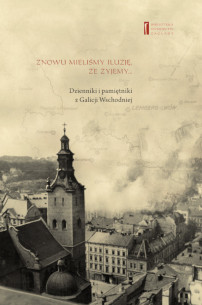
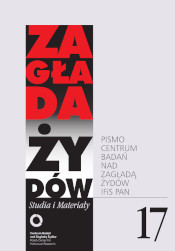
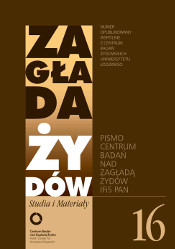
.jpg)
.jpg)
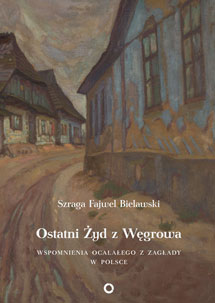
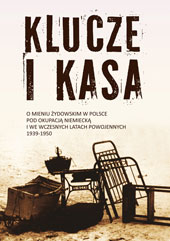
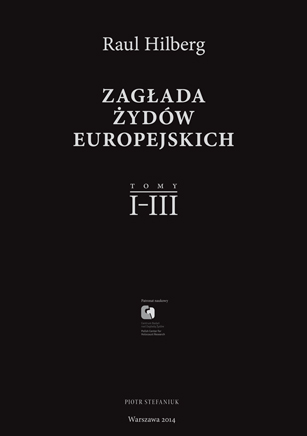
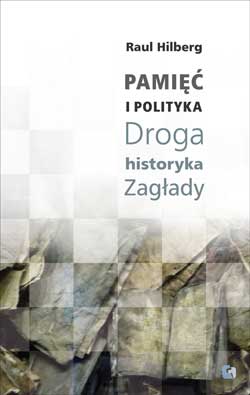
.jpg)
.jpg)
.jpg)
.jpg)
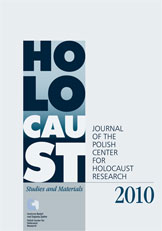

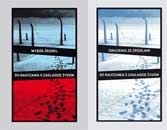
.jpg)
.jpg)
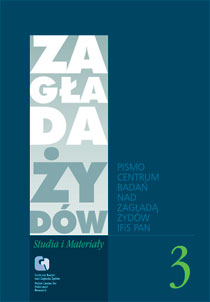
.jpg)
